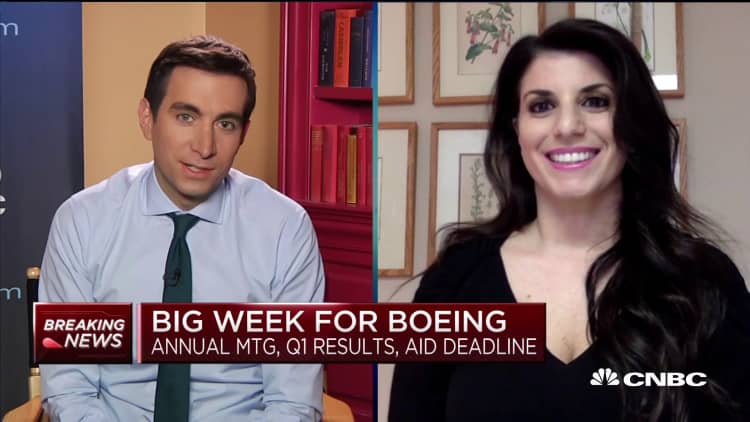Boeing CEO Dave Calhoun told shareholders Monday that air travel demand will take two or three years to recover to last year's levels, another problem for the manufacturer that was reeling from the 737 Max grounding before the coronavirus pandemic. Shareholders approved the company's board.
Boeing is scrambling to cut costs amid a weak market for new jetliners. That evaporating demand as air travel is largely on hold around the world, is a problem for both Boeing and its main rival, Europe's Airbus, which has cut production rates by a third.
Air travel demand in the U.S. is about 5% of what it was a year ago and airlines have parked more than a third of the country's fleet, while some carriers are planning to defer orders of new planes.
"We are in an unpredictable and fast-changing environment, and it is difficult to estimate when the situation will stabilize," Calhoun said in a webcast of the company's annual shareholders meeting. "When it does, the commercial market will be smaller, and our customers' needs will be different."
Cancellations are already piling up for Boeing as airlines scrap orders for dozens of 737 Max planes, the jetliner that has been grounded since March 2019 after two fatal crashes killed all 346 people aboard the flights.
Boeing is offering employees buyouts and other voluntary leaves but other measures haven't been ruled out as the company tries to reduce payroll costs. It has also suspended its dividend and CEO Calhoun told shareholders on Monday that it would likely be years before it returns.
On Saturday, Boeing said it is walking away from a proposed $4.2 billion deal with Embraer that would have given Boeing control of the Brazilian aircraft manufacturer's commercial airplane unit. Embraer said Boeing "wrongfully terminated" their agreement and on Monday said it has started arbitration proceedings over the scuttled deal.
"It is deeply disappointing, but we had reached a point where continued negotiation was no longer helpful, and so we exercised the rights set out in the [deal agreement] to terminate the agreement," Calhoun told shareholders on Monday.
The manufacturer is expected to lower already-reduced production of wide-body jets like the 787 Dreamliner. Demand for international travel will return at a slower pace than domestic, Calhoun predicted. That means airlines' and leasing firms' appetites will return faster for narrow-body planes, like the Max and Airbus A320 families, that are used for shorter routes.
Boeing is scheduled to report first-quarter results before the market opens on Wednesday, when executives are expected to outline the company's production plan, cash-raising activity and whether it expects to apply for and receive government support to weather the coronavirus slump.



